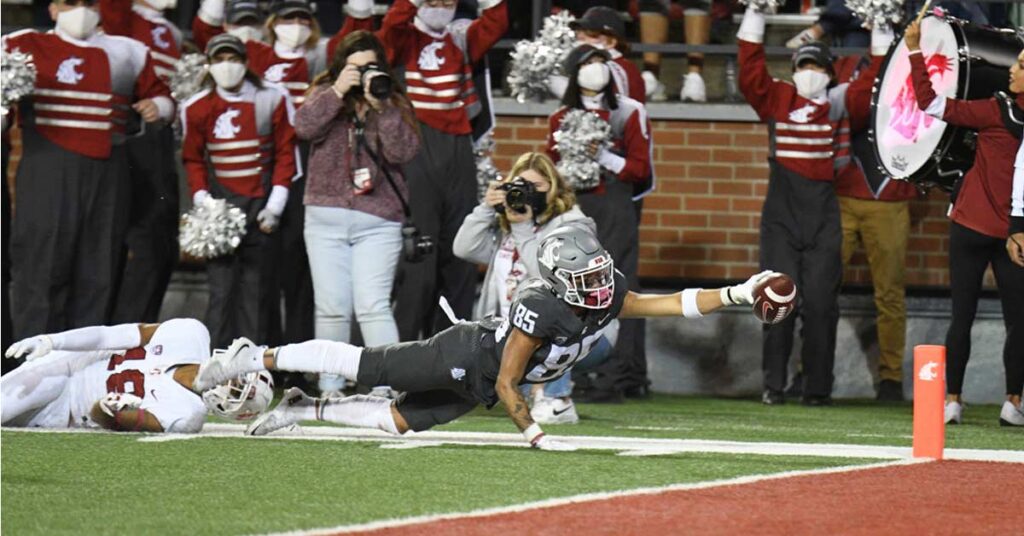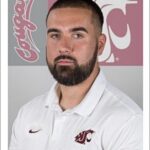
Jimmie Bunting is an assistant strength and conditioning coach for Washington State University Football. Prior to Washington State, he was the Director of Strength and Conditioning at McNeese State University. Prior to that, Jimmie had stops at Colorado State, the University of Wisconsin, and Ohio State University. He holds multiple certifications, including CSCS, SCCC, and FRCms.
Freelap USA: You have risen through the ranks rather quickly in your career. What piece of advice would you give a young strength coach looking to land their first job?
Jimmie Bunting: There are many pieces of advice I would give a young strength coach. First and most importantly, value and build relationships. The relationships you build as an intern will last the rest of your career and help you land jobs as you continue your path in the field of strength and conditioning. Who you know will get you in the door; what you know will keep you there.
Another important aspect that connects with that is interning under someone who you think runs a program at a high level and also does so in a professional manner. Lastly, have a growth mindset. No matter where you are in your career, you won’t ever know everything. Be humble and always have the hunger to keep learning.
Freelap USA: What attributes make up a great assistant on a strength staff?
Jimmie Bunting: There are many ways you can add value to the staff as an assistant strength coach. The most important thing to me is to carry out the vision of the head sport coach and the head strength coach. The strength staff spends the most time around the players compared to anyone else in the organization, so you must nurture the culture and vision daily. Hold the standard and vision no matter what.
Second, it’s important to develop a skill set that will make you stand out in the crowded field of strength and conditioning. Every coach knows how to coach a clean, squat, and bench. All coaches have their CSCS or SCCC certification. Having a skill that you specialize in will add value to you and make you more desirable to hire. These skills include nutrition, return to play, sports science, etc. Find out which one you are passionate about early on and continue to develop and sharpen that skill as you advance in your career.
Freelap USA: What are some challenges you did not expect to face when becoming a head strength coach, and what did you learn from them?
Jimmie Bunting: Fortunately, I’ve been extremely blessed to work under coaches who I believe to be some of the best strength coaches in the country. Those experiences prepared me tremendously to step into the role of a head strength coach.
The biggest lesson I learned early on was to have a bird’s-eye view of the operation at all times. As an assistant, it’s easy to have tunnel vision and just focus on the group you’re coaching. As a head strength coach, you must always see everything, letting nothing slip through the cracks. This ensures that you are holding every athlete in the organization to the same standard and seeing each individual’s performance, so you can assess what needs to be adjusted or implemented in your program.
Also, your sport coaches will always be watching their respective position group. Having this bird’s-eye view allows you to give them feedback when needed. Always be prepared to report on every student-athlete in the program at any given time.
Freelap USA: What advice would you give to strength coaches who are looking to better connect with the sport coaches that they serve?
Jimmie Bunting: The biggest thing for me is having a genuine interest in getting to know them on a personal level, not just knowing them as a coach. Build a genuine relationship with them just as you would with your athletes. The work will mean so much more if you are invested in each other and have a strong, healthy relationship.
Additionally, ask them questions about their beliefs on the sport they coach. Know their philosophy and the skill sets they look for in their athletes. Building the relationship and knowing what they want from their athletes will strengthen your connection and let them know you care and are invested in the program.
Freelap USA: In what ways can strength coaches help better the profession?
Jimmie Bunting: First off, do your job to the best of your ability. Second, do your job with a high level of professionalism and expertise. Oftentimes, strength coaches are looked at as just the “pick stuff up, set stuff down crew” (something I’ve personally been referred to as) who run around screaming and yelling for no reason.
Yes, it’s important to have a level of passion and intensity and a sense of urgency. There is also a fine line that we must walk! We as a field want to be respected and valued, and rightfully so. To get that, we must first make sure our own area operates at a high level.
Last, I would say be open to the fact that there are more right ways to do things than the way you personally do it. Even though you may not think the way another strength coach does things is the best way to do it, respect their philosophy. Look at the way they do it and things you can take and learn from that.
Personally, since I’ve had more of an open mind on that, it has changed my philosophies for the better. There are thousands of different techniques out there when it comes to mental and physical training. Be respectful when approaching others about the way they conduct their business!
Photo by Robert Johnson/Icon Sportswire.

